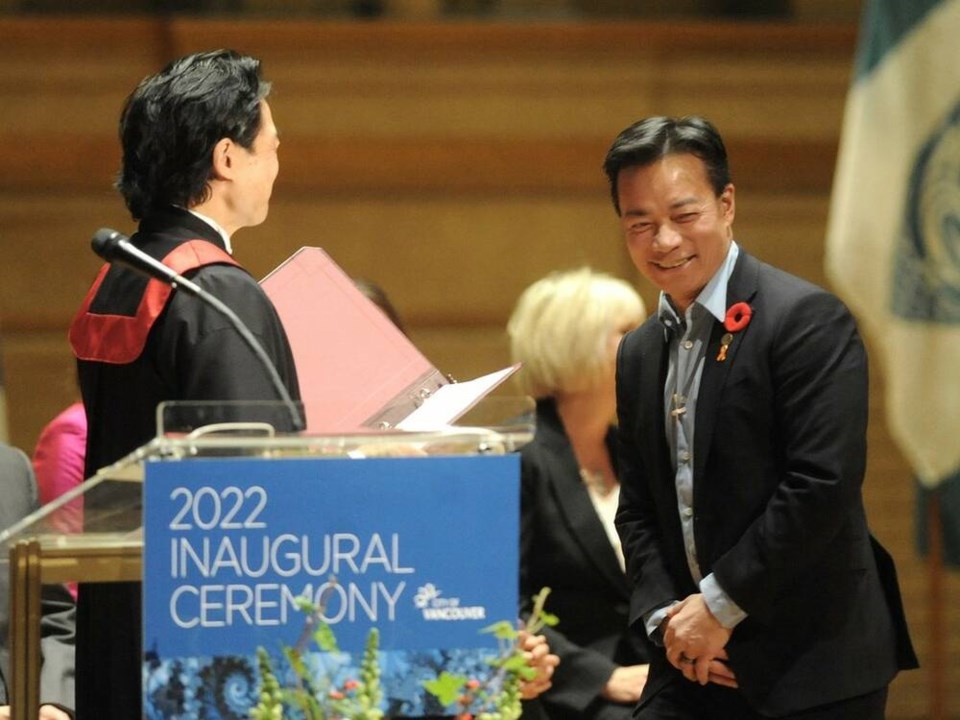When Vancouver Mayor Ken Sim and the rest of the city’s newly elected council members were sworn in last November at the Orpheum Theatre, five leaders of Christian, Jewish, Sikh and Muslim faiths were invited to participate in the inaugural ceremony.
One of them, Roman Catholic deacon Richard Chau, recited a Bible verse.
“What does the Lord require of you? To act justly, and to love mercy, and to walk humbly with your God.”
Vancouver was one of seven municipalities called out by the B.C. Humanist Association this week for invoking prayers in their inaugural 2022 meetings in violation of the state’s “duty” of religious neutrality.
The other cities were Delta, West Kelowna, Belcarra, Colwood, Parksville and Tumbler Ridge.
In Colwood, the association says, the council meeting opened with the Royal Bay Secondary School Choir singing Deo gratias. Though it wasn’t described as a prayer in the agenda, the organization included the “overtly religious song based on the Catholic liturgy” in its list of prayers an inaugural meetings.
Ian Bushfield, the association’s executive-director, said while the Vancouver’s inaugural ceremony involved leaders from multiple faiths, that approach “still failed to meet the diversity of the city.”
Bushfield cited 2021 census data that showed a majority of Vancouver residents — 56 per cent — identified as non-religious.
“With an inaugural ceremony like this, the message Vancouver sent citizens is that they are not reflected on council. Even if we just look at what religions are most prevalent, the message didn’t include Buddhism or Hinduism.”
Postmedia made multiple attempts to contact Sim’s office for comment but did not get a reply.
Documents obtained by the association through a freedom-of-information request reveal it was Sim who was behind the decision.
“Mayor-elect Ken Sim has asked that we invite five religious leaders to bring greetings at the ceremony,” reads an email sent Oct. 27, 2022, by city staff to United Church reverend Beth Hayward. “We are reaching out to you as well as religious leaders in the Muslim, Sikh, Jewish and Catholic communities.”
It was councillor Christine Boyle who recommended that Hayward be invited to deliver opening remarks at the Nov. 7, 2022, ceremony along with other religious leaders, the records show.
In an Oct. 26, 2022, email to city staff, Boyle suggested the inclusion of an Indigenous leader, a rabbi of interfaith studies, or Hayward, whom she identified as the minister of her own congregation: “She is great, and I suspect would be open to doing it.”
Hayward accepted the invite, offering a blessing alongside Chau; Harminder pal Singh, head granthi of the Khalsa Diwan Society; Tariq Tyab of the B.C. Muslim Association; and Rabbi Dan Moskovitz.
Singh shared a teaching from Sikh guru Granth Sahib: “Nanak naam charhdi kla,” he said, meaning “bless the whole world in positivity, peace and harmony.”
Moskovitz cited the Torah during his portion of the prayer.
He told Postmedia this week he disagrees with the B.C. Humanists’ opposition to such rituals.
“People with no faith tradition were not excluded from the event,” said the rabbi. “Plenty of times people speak languages that are not understood by me, but I make space for that in my heart and understanding because I know that it’s comforting to them.”
Moskovitz said given the level of division, distrust and intolerance in society right now, “the values espoused in these ecumenical prayers are needed.”
Since the B.C. Humanist Association began lobbying for the end of “opening prayer” at inaugural B.C. council meetings in 2018, it says only a small number of B.C.’s 162 municipalities have continued to keep the tradition, with the majority being conducted by Christian leaders.
Until last year, religious remarks had not been part of Vancouver’s inaugural council meetings since 2006.
“Sim brought it back,” said Bushfield. “The leaders spent 13 minutes on the prayer. At what point do you turn a municipal council meeting into a religious gathering or multi-faith ceremony?”
A Supreme Court of Canada ruling in 2015 found a prayer at the beginning of a city council meeting in Quebec infringed on citizens’ freedom of religion rights by “profess(ing) one religion to the exclusion of all others.”
“A neutral public space free from coercion, pressure and judgment on the part of public authorities in matters of spirituality is intended to protect every person’s freedom and dignity, and it helps preserve and promote the multicultural nature of Canadian society,” read the unanimous court decision.
The city of Saguenay had argued even the House of Commons holds a prayer before its sessions. But the ruling said that such proceedings could be subject to parliamentary privilege: “It would be inappropriate for the court to discuss its content or to use it to support a finding that the city’s prayer is valid.”
In its report, the B.C. Humanist Association noted the growing use of Indigenous content in inaugural meetings, including land acknowledgements, speeches from elders and drumming.
Bushfield said the association does not consider Indigenous blessings at council meetings as religious promotion.
“When councils acknowledge Indigenous territories or include greetings from an elder there is a different history and intention there,” Bushfield said.
“These are efforts to promote nation to nation dialogue and to reconcile for the harms of colonization. Prayers, on the other hand, historically served to proselytize or to connect the government with a religious worldview.”
— With a file from the Times Colonist



